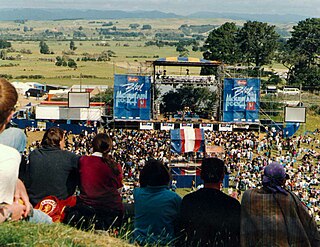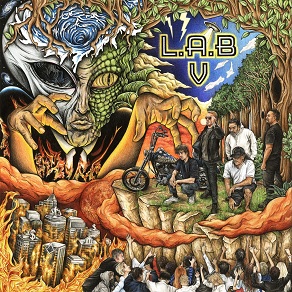
Robin Hugh Gibb was a British singer and songwriter. He gained worldwide fame as a member of the Bee Gees with elder brother Barry and twin brother Maurice. Robin Gibb also had his own successful solo career.
Blindspott is an alternative metal band from West Auckland, New Zealand. After performing under the name Blacklistt for several years, the original line-up got back together in 2018. The band was formed in 1997 with members Damian Alexander (vocals), Marcus Powell, Shelton Woolright (drums), Gareth Fleming (bass) and Karl Vilisini, also known as DJ Dlay.
Traditional Māori music, or pūoro Māori, is composed or performed by Māori, the indigenous people of New Zealand, and includes a wide variety of folk music styles, often integrated with poetry and dance.
Rock music in New Zealand, also known as Kiwi rock music and New Zealand rock music, rose to prominence first in 1955 with Johnny Cooper's cover version of Bill Haley's hit song "Rock Around the Clock". This was followed by Johnny Devlin, sometimes nicknamed New Zealand's Elvis Presley, and his cover of "Lawdy Miss Clawdy". The 1960s saw Max Merritt and the Meteors and Ray Columbus & the Invaders achieve success. In the 1970s and early 1980s the innovative Split Enz had success internationally as well as nationally, with member Neil Finn later continuing with Crowded House. Other influential bands in the 1970s were Th' Dudes, Dragon and Hello Sailor. The early 1980s saw the development of the indie rock "Dunedin sound", typified by Dunedin bands such as The Clean, Straitjacket Fits and The Chills, recorded by the Flying Nun record label of Christchurch. New Zealand's foremost hard rock band Shihad started their long career in 1988. Since 2018 this title is now undoubtedly held by New Zealand Māori metal band Alien Weaponry who have achieved huge success in Europe and the USA.

Music festivals have a long and chequered history in New Zealand. The first large outdoor rock music festivals were Redwood 70 in 1970 and the Great Ngaruawahia Music Festival in 1973. The largest was the 1979 Nambassa festival, one of several Nambassa festivals held around that time, in Golden Valley, just north of Waihi.
Moana Maree Maniapoto is a New Zealand singer, songwriter and documentary maker. Widely considered one of New Zealand's most successful indigenous acts, her music is described as a fusion of traditional Māori haka, chants and taonga pūoro, with contemporary soul, reggae and classical styles. Moana was briefly married to New Zealand politician and radio personality Willie Jackson, during which time she was known as Moana Maniapoto-Jackson; they divorced in 2001. In 2016, Moana was inducted into the New Zealand Music Hall of Fame.

Here at Last... Bee Gees... Live is the first live album by the Bee Gees. It was recorded on December 20, 1976 at the LA Forum and was released in May 1977 by RSO Records. It reached No. 8 in the US, No. 8 in Australia, No. 1 in New Zealand, and No. 2 in Spain.

Raymond John Patrick Columbus was a New Zealand Benny Award-winning singer and songwriter, television host, music manager and entertainer, with a career spanning six decades. As the lead singer of surf music band Ray Columbus & the Invaders, his best-known hit was "She's A Mod" in 1964.

Formerly known as Auckland Festival, Auckland Arts Festival or Te Ahurei Toi o Tāmaki Makaurau is an annual arts and cultural festival held in Auckland, New Zealand. The Festival features works from New Zealand, the Pacific, Asia and beyond, including world premieres of new works and international performing arts events.

The Rumour was a New Zealand pop/rock music band in the late 1960s and early 1970s. Formed in 1966 and featuring twin brothers Shade and Gerard Smith, Jacques Koolen and Ross Hindman they went on to achieve success in the NZ pop scene with chart-topping hits "L'amour Est L'enfant de la Liberte", No 1 on the New Zealand charts for four weeks and "Holy Morning". The band was at various times a duo, a trio, quartet and quintet.
The Loxene Golden Disc was an annual New Zealand music award which ran from 1965 to 1972. It was superseded by the Recording Arts Talent Awards (RATA).
The Chicks were a New Zealand singing sibling duo, active in the 1960s. Sisters Judy and Sue Donaldson scored several hits in their native country, including "Miss You Baby", which sounded similar to a song released by Lynne Randell entitled "Ciao Baby". After they split up, Sue launched a successful solo career as Suzanne Lynch, or simply, Suzanne. The Chicks were one of the local New Zealand acts who performed at Redwood 70, the first major modern music festival held in New Zealand in 1970.

Marlon Williams is a New Zealand singer-songwriter, guitarist and actor based in Lyttelton, New Zealand. Primarily known as a solo artist, he works and tours with his backing band The Yarra Benders and first came to attention as front-man of The Unfaithful Ways and for his collaborative work with musician Delaney Davidson.

Swanson is an outlying suburb of West Auckland, New Zealand and is located west of Henderson, surrounded by the Waitākere Ranges. Developing as a service centre for the kauri logging and gumdigging trades in the 1880s along the trainline, the town developed as a rural centre and an early tourist destination for Aucklanders, who visited the Redwood Park on the banks of the Swanson Stream. In the 1940s, the park became a training centre for soldiers in World War II, and in 1970 hosted Redwood 70, the first modern music festival in New Zealand.

Philip Reece Warren was a New Zealand music promoter, manager, agent and later a politician.
The Hamilton County Bluegrass Band is a long-running New Zealand bluegrass band. They have been performing since the 1960s.
Peter Warren New Zealand drummer primarily known as the drummer for DD Smash. Warren is also known by the nicknames 'Rooda' and 'Beat'. With a career spanning decades, Warren has been described as 'one of New Zealand's finest rock drummers.'
The Hi-Revving Tongues were a New Zealand rock band from Auckland, led by vocalist/songwriter Chris Parfitt.

Rodger Dennis Fox was a New Zealand trombonist, jazz educator, recording artist and leader of the Rodger Fox Big Band. He founded his jazz band in 1973 and toured extensively in New Zealand and overseas, playing at international jazz festivals including Montreux and Monterey. He was a jazz educator and taught at the New Zealand School of Music at Victoria University of Wellington.

L.A.B. V is the fifth studio album by New Zealand band L.A.B., released in December 2021. Featuring the singles "Mr Reggae" and "Under the Sun", the album was a commercial and critical success, reaching number one on the New Zealand Albums Chart, and winning the Aotearoa Music Award for Album of the Year.











